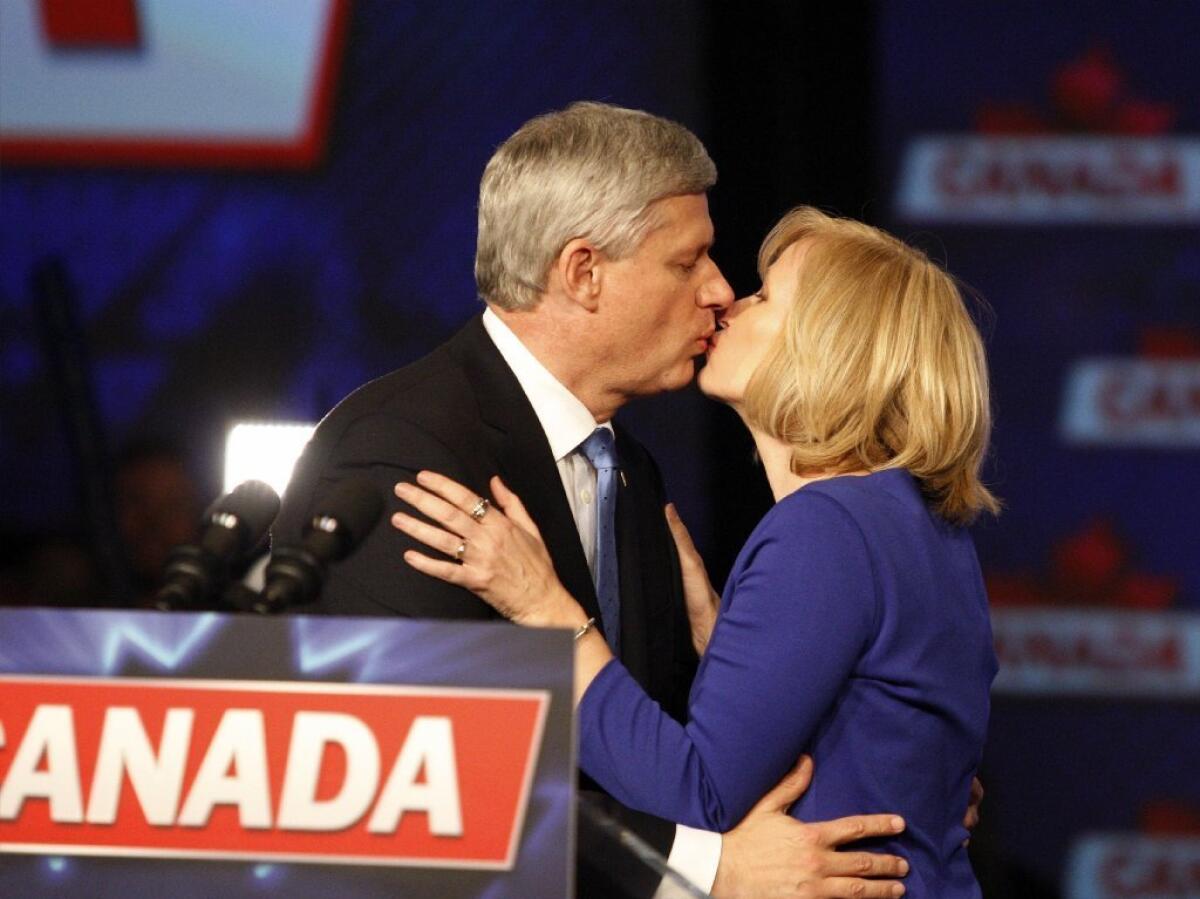Opinion: Did Islamophobia help defeat Canada’s prime minister?

Stephen Harper and his wife, Laureen, smooch before the prime minister addresses supporters on election night. He will be replaced by 43-year-old Justin Trudeau of the Liberal Party.
- Share via
Like any election outcome, the victory of Canada’s Liberal Party has inspired any number of instant interpretations.
Some analysts attribute the outcome on the public fatigue with Stephen Harper, the leader of the Conservative Party who had served as prime minister since 2006.
Others cite the youthful optimism of 43-year-old Justin Trudeau, the Liberal Party leader who will occupy the position of prime minister once held by his father, Pierre Elliott Trudeau, a Swinging Sixties figure known to many Americans via the spot-on impression of Canadian-born comedian Martin Short.
(Few credit Trudeau 2.0 with the smarts of his father. The New York Times decorously noted that he “does not flash the scalpel-sharp intelligence his father was known for.” Much of the criticism of younger Trudeau recalls the gibe about former U.S. Sen. John Tunney: “the lightweight son of a heavyweight champion.”)
As for issues, some credit Trudeau’s critique of the Conservative government’s fiscal austerity policies; others point to his preference for Canada’s tradition of multilateralism in foreign affairs and his opposition to Canadian participation in air strikes against Islamic State.
Then there is the niqab issue.
Harper had called for restrictions on Muslim women wearing that facial veil in public. After a court struck down a ban on women remaining veiled during naturalization ceremonies, he suggested that he would appeal the ruling to Canada’s Supreme Court. Trudeau called Harper’s position on the niqab “unworthy of someone who is prime minister for all Canadians.”
Writing for Vox, Matthew Yglesias argues that the gambit backfired against Harper for reasons having to do with the decline in support in Quebec for Canada’s third major party, the New Democratic Party, whose leader took a pro-niqab position. (It’s a complicated, if not convoluted, argument. You can follow it here.)
Whether or not Harper’s opposition to the niqab was decisive in the election, it certainly distinguished him from his fellow small-c conservative, George W. Bush.
Whatever his other faults, Bush advocated for religious freedom and against Islamophobia even (or especially) after 9/11 -- as has President Obama. (In a Sept. 20, 2001, speech, Bush told Muslims: “We respect your faith.”
When the French government was considering legislation to prohibit schoolchildren from wearing head scarves (or yarmulkes or conspicuous crucifixes), Bush’s administration sent this warning to then-President French President Jacques Chirac:
“A fundamental principle of religious freedom that we work for in many countries of the world, including on this very issue of head scarves, is that all persons should be able to practice their religion and beliefs peacefully, without government interference, as long as they are doing so without provocation and intimidation of others in society.”
Harper may wish that, on this issue, he had looked south for inspiration.
Follow Michael McGough on Twitter @MichaelMcGough3.
More to Read
A cure for the common opinion
Get thought-provoking perspectives with our weekly newsletter.
You may occasionally receive promotional content from the Los Angeles Times.










